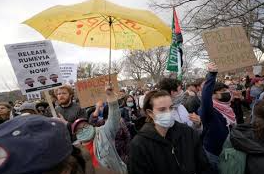
Resignation leaves the country’s fragile transition to democracy hanging in the balance.
Prime Minister Abdalla Hamdok’s decision to resign has intensified Sudan’s political uncertainty, complicating the country’s ongoing transition to democratic governance. In a televised address, Hamdok announced his resignation on Sunday, citing his inability to establish political consensus after an October 25 military coup that disrupted the transitional government.
Hamdok called for immediate dialogue to devise a roadmap for completing Sudan’s transition to democracy. His departure comes after more than two years of progress following the 2019 overthrow of Omar al-Bashir, who ruled Sudan for three decades under an Islamist regime.
WHAT LED TO THIS POINT?
On October 25, 2021, Sudan’s military dissolved the transitional government, detaining Hamdok and several other officials. The coup, led by General Abdel-Fattah Burhan, dismantled the Sovereign Council, a joint civilian-military ruling body established in 2019.
Burhan announced the military would oversee the country until elections in mid-2023, proposing a technocratic government in the interim. International condemnation followed swiftly, with the U.S. suspending $700 million in aid. Hamdok was reinstated in November as part of a controversial agreement that sidelined the pro-democracy movement but aimed to stabilise the political landscape.
Despite his reinstatement, Hamdok struggled to form a government amid widespread protests. These demonstrations opposed both military control and his compromise with the generals. Since the coup, nearly 60 people have been killed in clashes with security forces, with reports of severe human rights violations, including sexual violence.
THE PRO-DEMOCRACY MOVEMENT
The Forces for the Declaration of Freedom and Change, a coalition central to Sudan’s pro-democracy movement, remains divided. Some groups aligned with the military, while others, including the Sudanese Professionals Association and the Resistance Committees, rejected any collaboration with the generals, insisting on full civilian rule.
Hamdok’s inability to bridge the gap between these factions and the military further deepened the crisis, leaving the transitional government paralysed.
WHAT’S NEXT FOR SUDAN?
Sudan faces a precarious future. Protest groups continue to demand full civilian leadership, but the military remains steadfast, with Burhan reiterating that power will only transition to an elected government.
The U.N. envoy for Sudan, Volker Perthes, has called for inclusive talks to break the deadlock. Meanwhile, the U.S. has urged leaders to find consensus, stressing adherence to the 2019 constitutional declaration as a basis for appointing a new prime minister and Cabinet.
Cameron Hudson, a Sudan expert at the Atlantic Council, highlighted the need for international mediation to achieve political compromise and chart a path forward.
In his resignation speech, Hamdok warned that Sudan’s political stalemate could escalate into a severe crisis, further threatening the country’s fragile economy. “Our nation is at a dangerous crossroads,” he said, urging for urgent action to salvage the transition and safeguard Sudan’s future.












